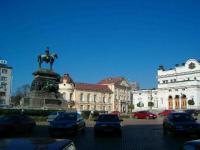 International observers say that Bulgaria’s July 5 general elections were a cause for some concern amid vote-buying accusations, but stress that the outcome of the poll reflected the will of the people.
International observers say that Bulgaria’s July 5 general elections were a cause for some concern amid vote-buying accusations, but stress that the outcome of the poll reflected the will of the people.
The Organization for Security and Cooperation in Europe, OSCE, and the Parliamentary Assembly of the Council of Europe, PACE, sent monitors for the first such observer mission to a general election in an EU member state.
The international observers relied mainly on media reports and discussions with diplomats, journalists and party and electoral commission members in determining their rating of Bulgaria’s general election.
Turnout was high, at 60.2 per cent of the 6.8 million eligible to vote. With the vote count almost completed, centre-right opposition GERB won 39.7 per cent of the vote, with up to 116 seats in the 240-seat parliament. The Socialists had 17.7 per cent and 40 seats, only half of their previous total.
PACE mission chief Tadeusz Iwinski told reporters at a news conference in Sofia that the organization was “not ready to give a clean bill of health to the election.”
“We are unhappy about the evident lack of public confidence in the democratic process and an overall voter cynicism exemplified in the broadly admitted practice of selling and buying votes,” Iwinski said.
As such, the OSCE’s Office for Democratic Institutions and Human Rights (ODIHR) will ask PACE to restart the monitoring mechanism for elections in Bulgaria. The monitoring mechanism was terminated when Bulgaria joined the EU in 2007.
Head of the OSCE/ODIHR limited election observation mission, Colin Munro, told reporters: “We do draw attention to the efforts made to combat alleged vote-buying, a crime now punishable by imprisonment of up to six years, but this did not stop the pervasive and persistent allegations of vote-buying.”
On July 6, one day after the election, police in Sofia arrested Deputy Emergency Situations Minister Alexander Filipov, accused of arranging a vote-trading scheme with Varna-based Roma businessman Baku Stoyanov.
The daily Dnevnik reported that Filipov had misappropriated “millions of euros from European funds – the money was used to buy votes for the elections.”
Currently, both Filipov and Stoyanov are under arrest and a criminal case has been opened.
According to Dnevnik, both were engaged with purchasing votes in favor of the National Movement for Stability and Progress, NMSP, party, which suffered a heavy defeat in the election and lost all government representation. After the arrests, NMSP said in statement that Filipov withdrew from the party two months ago.
Allegedly, Filipov the country’s only deputy minister of Roma origin, had arranged for firms run by Stoyanov to win public tenders worth millions of euros, mainly in construction sector.
In exchange, 30 per cent of the contracts’ worth was returned in the form of money that was subsequently used to buy votes. Stoyanov was allegedly entrusted with ‘securing’ several thousand votes, predominantly from the Roma community.
Prime Minister-designate and the leader of GERB Boyko Borisov has already announced the closure of the emergency situations ministry.
Several people have already been sentenced this year to fines or suspended terms for vote-buying. The Interior Ministry has reported 175 suspected cases since the start of the campaign.
Voters from Roma, interviewed by local journalists, also said they had been offered money, food or jobs by different parties if they voted for them.
 Eurasia Press & News
Eurasia Press & News
